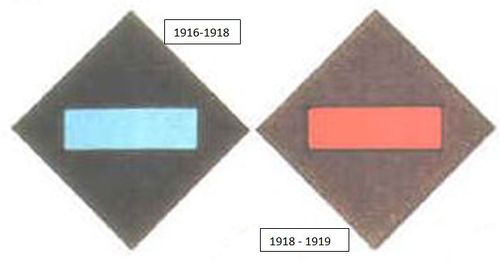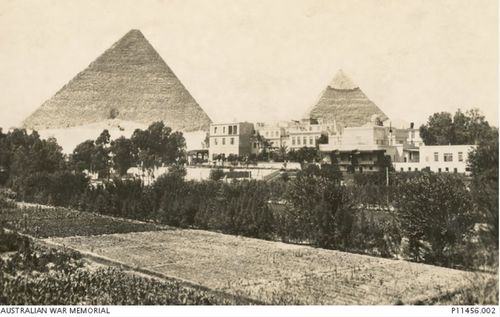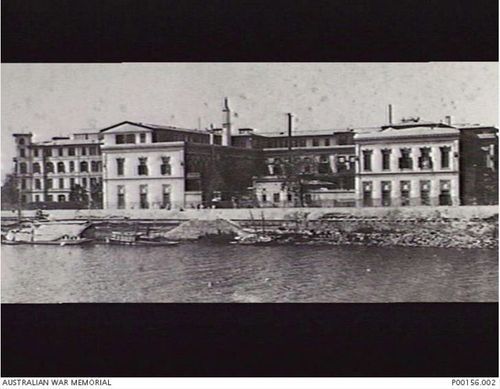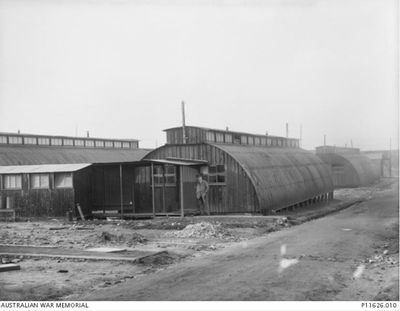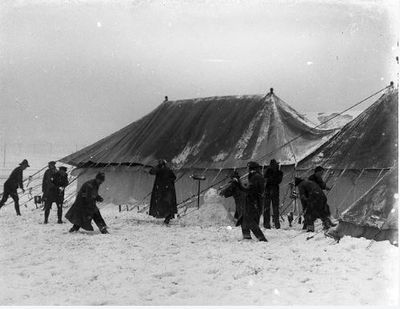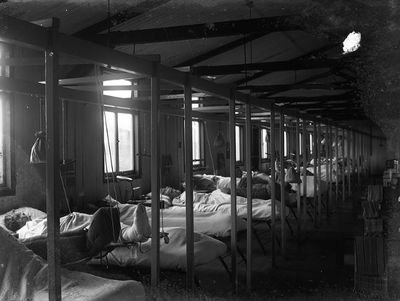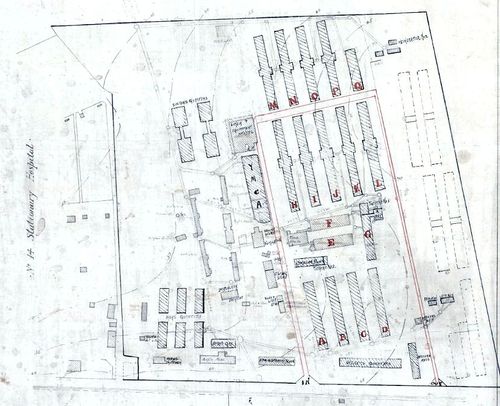Difference between revisions of "2nd Australian General Hospital"
From Our Contribution
(→Soldier Patients by date admitted) |
(→Soldier Patients by date admitted) |
||
| Line 103: | Line 103: | ||
*[[William Mathews]] 30 Jul - 8 Aug 1916 | *[[William Mathews]] 30 Jul - 8 Aug 1916 | ||
*[[Alexander Russell Main]] 19 & 20 Aug 1916 | *[[Alexander Russell Main]] 19 & 20 Aug 1916 | ||
| − | *[[William Hart]] 1 Sep 1916 | + | *[[William Hart]] 1 Sep 1916 - Post ww1 men |
*[[Edward Patrick Thomas O'Brien]] 9 - 11 Nov 1916 | *[[Edward Patrick Thomas O'Brien]] 9 - 11 Nov 1916 | ||
*[[Herbert Frank O'Neill]] 30 Nov - 2 Dec 1916 | *[[Herbert Frank O'Neill]] 30 Nov - 2 Dec 1916 | ||
Revision as of 01:14, 19 February 2019
General Information
The first matron of 2AGH was a Boer War nurse. On 27 Sep 1914 Miss Ellen Julia (Nellie) Gould enlisted in the Australian Imperial Force and was appointed Matron of No.2 Australian General Hospital.
With six other nurses she left Australia on 20 October, disembarking at Alexandria, Egypt, on 4 Dec 1914. The hospital unit's main body departed Australia aboard HMAT A55 Kyarra on 28 Nov 1914 and on its arrival, Matron Gould took up her duties as Matron on 21 Jan 1915. The staff were established at Mena House when, a few months later, casualties from Gallipoli made necessary the preparation of a second hospital at Ghezireh Palace. The two hospitals had a total of 1500 beds. In March 1916 the hospital was ordered to close and to follow 1 ANZAC Corps and the 2nd Division to France.
In April 1916 the 2nd Australian General Hospital was transferred to France aboard the Braemar Castle and after a brief period as an isolation hospital at Moussot near Marseilles screening for infectious cases from Egypt, it established itself at Wimereux near Boulogne, arriving on 30 Jun 1916, the eve of the advance on the Somme. Its nursing staff numbered 115 at this time. Sister Norma Heritage was left at Moussot with 19 Sisters and Staff Nurses, and she re-joined the unit on 18 Aug 1916.
They took over the partly completed facility left by the departure of the 5th British Convalescent Hospital, and accepted their first patients on 2 Jul 1916. Initially patients were accommodated in tents, but later 17 huts and one line of tents were provided. Although hospitals alongside treated Australian wounded, they seldom received the Australian casualties, but received them from other Commonwealth nations.
The hospital was the target of several enemy actions in late September, early October 1917, from both artillery shell fire and aerial bombing. Two horses were killed and the tents were riddled with shrapnel, while one orderly suffered shell shock. The hospital came to specialise in the treatment of fractures, and following the cessation of hostilities it was over run by patients with influenza.
The 2nd Australian General Hospital closed at Wimereux on 7 Feb 1919, with nursing staff released in groups of 10 between 12 Mar and 19 Mar 1919 to begin the return journey to Australia via England.
Staff
- William George Russell 13 Nov 1916 - 7 May 1917
See https://rslvirtualwarmemorial.org.au/explore/units/53/people for a list of all personnel who served in 2nd AGH overseas. Six staff died on active service and one other shortly after their return to Australia.
Individual Honours
- 1 Companion of the Order of St Michael and St John
- 1 Royal red Cross (2nd Class)
- 10 Mentioned in Despatches
- 1 foreign award
Soldier Patients by date admitted
Egypt
1915
- Arthur Pilgrim 3 Jan - 4 Feb 1915
- Victor Henry Marshall 31 May - 1 Jun 1915
- Frederick William Scott 26 May - 8 Jun 1915
- George Weston Firns 9 Sep 1915 - 30 Oct 1915
- George Weston Firns 26 Nov - 24 Dec 1915
- William Buck 1 - 9 Dec 1915
- James Owen Horrocks 4 - 8 Dec 1915
- Sidney Tugby 14 - 16 Dec 1915
- Frederick Fancote 28 Dec 1915 - 4 Jan 1916
1916
- Robert Melville Salter 4 Jan - 11 Apr 1916
- Charles Edward Parkin 7 - 31 Jan 1916
- Victor Thomas Emanuel Compassi 14 - 24 Jan 1916
- George Wales McGillivray 18 Jan - 8 Feb 1916
- Frederick Selkirk 28 Jan - 11 Feb 1916
- Edward William Tink 5 Feb - ?? Mar 1916
- John Harold Rupert Smith 7 - 16 Feb 1916
France
1916
- Albert Edward John Walls 23 - 26 Apr 1916
- John James Lynes Chester 6 May 1916
- John Hugh Jones 12 - 16 Jun 1916
- William Mathews 30 Jul - 8 Aug 1916
- Alexander Russell Main 19 & 20 Aug 1916
- William Hart 1 Sep 1916 - Post ww1 men
- Edward Patrick Thomas O'Brien 9 - 11 Nov 1916
- Herbert Frank O'Neill 30 Nov - 2 Dec 1916
- Samuel Vivian Mortimer 2 -3 Dec 1916
1917
- William George Russell 6 - 11 Jan 1917
- John Henry Holroyd 4 - 11 Apr 1917
- Albert Helliwell 22 & 23 Apr 1917
- William Arthur Shepherd 3 May 1917
- John Henry Whitfield 6 - 10 Jun 1917
- Ronald Daniel Wallace 13 Jun - 22 Jul 1917
- John Arthur Patterson MM 1 - 7 Aug 1917
- John Humphrey Coyle 7 - 10 Oct 1917
- Robert Frank Bickford 7 - 11 Oct 1917
- William Edward Butcher MM RMG MID 14 -17 Oct 1917
- Daniel Adkins Lewis 15 & 16 Oct 1917
- Norman Sedrick Tonkin 17 - 20 Oct 1917
- Albert Edgar Bishop 3 - 15 Nov 1917
1918
- Aubrey Walter (Swazz) Mead 5 - 8 Feb 1918
- David Alexander Sayer 6 - 11 May 1918
- William Isaac Little 3 Jun - 12 Aug 1918
- James Baillie 9 - 20 Aug 1918
- Pierre Wolfe Daimpre 24 - 30 Sep 1918
- Alfred Haddy Pearse 6 - 22 Oct 1918
- Hubert Maitland Armstrong MM 30 Oct - 20 Nov 1918
